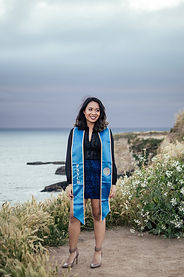

.jpg)
"Take your time. At AOC, there’s this compulsion to rush towards your dream career as quickly as possible, but it’s really, really difficult to be taken seriously as a mental health professional in your early twenties."
MILESTONES
My career roadmap has been defined since the beginning.
When I was in sixth grade, I saw a career day presentation from a psychologist. I decided, then and there, that I wanted to be a therapist. I haven’t changed my mind since.
Later, in high school, I saw first-hand how productive and meaningful therapy could be. I saw therapy as a chance to do real, tangible good in a world overwhelmed with pain and in need of healing.
As a college freshman at UCSC, I realized I have a knack for research, and a TA offered to mentor me in a path towards a PhD. After some thought and discussion, I realized I was called to the Practitioner-Scholar therapeutic model, which emphasizes therapy heavily informed by research.

EXPERIENCE
Here are my extracurriculars relevant to this pathway
DURING MY HIGH SCHOOL CAREER
I was an executive member of AOC’s Gay-Straight-Alliance club--founded by my friend Schafer Collins!--and considered specializing in therapy for LGBTQ+ youth.
I tutored underprivileged children of single mothers after school.
DURING MY COLLEGE CAREER
I taught English to Chinese students online in college.
I joined a Cognitive Behavioral Therapy group on-campus at UCSC.
I was a Kresge College academic mentor for freshmen. I led my own section and personally mentored thirty students in their academic careers and transitions to college life at Kresge (Fiat Slug!). My sections were structured to encourage community-building and a network of emotional support for my students.
CAREER
What I'm currently doing/hope to do
I am a paraeducator at a combined middle- and high school in Santa Cruz. I support students with autism, ADHD, emotional disturbances (ED), and other learning disabilities academically and emotionally. Under the supervision of the school psychologist, I lead a group which promotes prosocial behavior and hones social skills in middle schoolers. I’m working on applications for graduate school, and hope to enroll in a PsyD program in Fall 2021.
ADVICE
How to maximize my time in high school?
Advice #1: Connect with your teachers! This one seems obvious at a school like AOC, but engaging with teachers at AOC was personally and intellectually enriching for me; in college, I knew I could always fall back on their support if I needed it. I was also one of the only people I knew who could comfortably interact with professors and administrators, which meant I had more access to resources and opportunities than my peers. The ability to communicate with people in positions of power saved me from graduating a quarter late when the advising department made a huge error with my schedule in my senior year.
Advice #2: Take your time. At AOC, there’s this compulsion to rush towards your dream career as quickly as possible, but it’s really, really difficult to be taken seriously as a mental health professional in your early twenties. If you graduate with your bachelors in two years, don’t dive directly into a licensure program. No one wants a twenty-two year old therapist. Instead, build your life experience and learn to relate to people very different from you.
Advice #3: Practice exercising empathy in places which make you uncomfortable, and start young. The people in your environment likely come from a similar socioeconomic and cultural background, but if you’re considering a career in therapy or social work, that may not be the case. Vulnerable populations make people in power uncomfortable; that includes people with disabilities, addiction, and mental illness. You most likely come from a background of economic and educational power; confront your own biases and fight through that learned discomfort. It’ll make you better prepared for a mental health profession and a better person.

.jpg)



